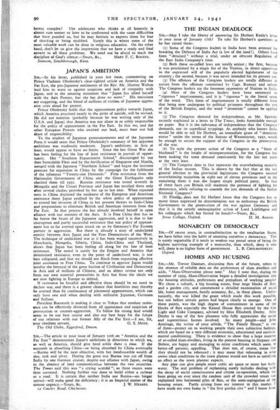JAPAN'S AMBITION
SIR,—In his letter, published in your last issue, commenting on Prince Vladimir Obolensky's clear-sighted article on America and the Far East, the pro-Japanese sentiments of the Rev. Mr. Murray Walton lead him to warn us against suspicion and lack of sympathy with Japan, and to the amazing statement that "Japan has allied herself with the Axis Powers, but she has done no more." His omissions are staggering, and the blood of millions of victims of Japanese aggres- sion cries aloud for protest.
Prince Obolensky holds that the appeasement policy towards Japan, which America practised nearly to the point of suicide, will be revised. He did not mention (probably because he was writing only of the U.S.A. and Japan) that America was not alone in or solely responsible for the policy of appeasement in the Far East. In that we, and the other European Powers who awaited our lead, must bear our full share of responsibility.
To the student of Japanese pronouncements and of the Japanese Press it would seem that Prince Obolensky's summary of her apparent ambitions was studiously moderate. Japan's ambitions, in Asia at least, would appear to have no limits. Since the last Great War she has been feeling for the line of least resistance in pursuit of oppor- tunity. Her "Southern Expansionist School," discouraged by our then formidable Fleet and by the fortification of Singapore and Manila, merged with the Japanese "Northern School" and began the insistent pressure for expansion in China by the campaign for the fulfilment of the infamous "Twenty-one Demands." Firm resistance from 'the Nationalist Government of China and the Great Earthquake only checked them till 1931. Russian resistance was tested severely in Mongolia and the Ussuri Province and Japan has recoiled there only after several clashes provoked by her up to last year. When repeated tests in China disclosed the weakness of the European and American resistance there Japan profited by the white policy of appeasement to extend her invasion of China to her present threats to Indo-China and preparations to eliminate British and American interests from the Far East. In that process she has already involved herself in open alliance with our enemies of the Axis. It is Free China that has so far borne the brunt of the Japanese aggression, and it is due to her courageous and partly successful resistance that our policy of appease- ment has so far averted open attack on us by Germany's Far Eastern partner in aggression. But there is already a state of undeclared enmity between Axis Japan and the Free Democracies of the West. The technique of undeclared war as it has been waged successively in Manchuria, Mongolia, Siberia, China, Indo-China and Thailand, shows that Japan has been feeling all along for the line of least resistance. The moral is surely for the Empire and America that determined resistance, even to the point of undeclared war, is our best safeguard, and that we should not flinch from organising effective joint assistance to Free China. To continue to appease japan would involve the betrayal of the great bastion of Civilisation and Democracy in Asia and of millions of Chinese, and an abject retreat not only from our own material possessions in Asia but from the ideals we are now fighting in Europe to defend.
If resistance be forceful and effective there should be no need to declare war, and there is a greater chance that hostilities may thereby be averted than by continuance of piecemeal appeasement, which can only have one end when dealing with militarist Japanese, Germans and Italians.
President Roosevelt is making it clear to Tokyo that resolute resist- ance can be effectively divorced from all appearance and suspicion of provocation or counter-aggression. To follow his strong lead would seem to be our best course and also our best hope for the future of our relations with our former Ally of the Far East.—! am, Sir,






























 Previous page
Previous page